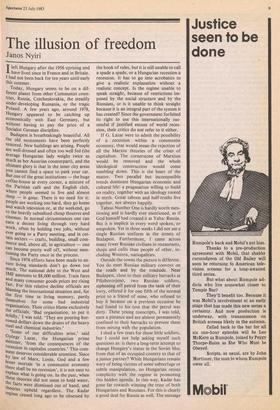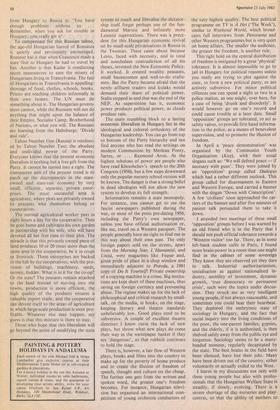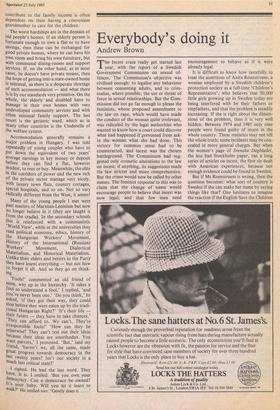The illusion of freedom
Janos Nyiri
Ileft Hungary after the 1956 uprising and have lived since in France and in Britain. I had not been back for ten years until early this summer.
Today, Hungary seems to be on a dif- ferent planet from other Communist coun- tries, Russia, Czechoslovakia, the steadily under-developing Rumania, or the tragic Poland. A few years ago, around 1978, Hungary appeared to be catching up economically with East Germany, but without having to pay the price of a Socialist German discipline.
Budapest is breathtakingly beautiful. All the old monuments have been perfectly restored. New buildings are arising. People are well-dressed and often too well fed (the average Hungarian lady weighs twice as much as her Austrian counterpart), and the ultimate glory is that in the inner city areas you cannot find a space to park your car. But one of the great institutions — the huge coffee-house at every corner, a mixture of the Parisian café and the English club, where people seemed to live and almost sleep — is gone. There is no need for it: People are working too hard, they go home and watch television or, at the weekend, go to the heavily subsidised cheap theatres and cinemas. In normal circumstances one can earn a decent living through very hard work, often by holding two jobs, without ever going to a Party meeting, and in cer- tain sectors — crafts, building, small com- merce and, above all, in agriculture — one can become pretty well off, without men- tioning the Party once in the process. Since 1978 efforts have been made to en- sure living standards don't go down too much. The national debt to the West and IMF amounts to $8,000 million. Train fares and many consumer goods prices are rising fast. For this relative decline officials are blaming the international situation and, for the first time in living memory, partly themselves for some bad industrial organisation. Their critics blame exclusively the officials. 'Bad organisation, to put it mildly,' I was told. 'They are pouring bor- rowed dollars down the drains of the heavy steel and chemical industries.'
Some of our difficulties arise,' said GrirgY Lazar, the Hungarian prime minister, 'from the consequences of the recession in capitalist countries.' This com- ment deserves considerable attention. Since by law of Marx, Lenin, God and a few lesser mortals 'in a communist economy there shall be no recession', it is not easy to explain what is going on. In the past, when these theories did not seem to hold water, the facts were dismissed out of hand, and theories upheld regardless. The Kadar regime ceased long ago to be obsessed by
the book of rules, but it is still unable to call a spade a spade, or a Hungarian recession a recession. It has to go into acrobatics to give a realistic explanation without a realistic concept. Is the regime unable to speak straight, because of restrictions im- posed by the social structure and by the Russians, or is it unable to think straight because it is an integral part of the system it has created? Since the government forfeited its right to use this internationally suc- cessful if justified excuse of world reces- sion, their critics do not refer to it either.
If G. Lazar were to admit the possibility of a recession within a communist economy, that would mean the rejection of all the Marxist theories of the crises of capitalism. The cornerstone of Marxism would be removed and the whole ideological construction would come tumbling down. This is the heart of the matter. Two parallel but incompatible trends dominate Hungarian economic and cultural life: a pragmatism willing to build on reality, together with an ideology rooted in myth. Great taboos and half-truths live together, not always happily.
Taboo Number One is hardly worth men- tioning and is hardly ever mentioned, as if God himself had created it at Yalta: Russia. But it is implicit in every word spoken, or unspoken. Yet in three weeks I did not see a single Russian uniform in the streets of Budapest. Furthermore, I came across many fewer Russian civilians in restaurants, shops and cafes than people of other, in- cluding Western, nationalities.
Outside the towns the picture is different. You do meet Russian military convoys on the roads and by the roadside. Near Budapest, close to their military barracks at PilisborosjenO, two Russian soldiers, siphoning off petrol from the tank of their lorry, offered it for one fifth of the normal price to a friend of mine, who refused to buy it because on a previous occasion he had found to his cost that the petrol was dirty. These young conscripts, I was told, earn a pittance and are almost permanently confined to their barracks to prevent them from mixing with the population.
I shed a few tears for those little soldiers, but l could not help asking myself such questions as: is there a long-term attempt to change Hungary's status in the Soviet bloc from that of an occupied country to that of a junior partner? While Hungarians remain wary of being victims of some subterfuge or subtle manipulation, no Hungarian resists complicity with the regime in promoting this hidden agenda. In this way, Kadar has gone far towards winning the trust of both Hungarians and Russians. For this is clearly a good deal for Russia as well. The message from Hungary to Russia is: 'You have enough problems without us ... Remember, when you ask for trouble in Hungary, you really get it'.
To compensate for this Russian taboo, the age-old Hungarian hatred of Romania is quietly and persistently encouraged. Rumour has it that when Ceaucescu made a state visit to Hungary he had to travel by bus. Another is that Kadar is conducting secret manoeuvres to ease the misery of Hungarians living in Transylvania. The fate of Hungarians in Transylvania is appalling: shortage of food, clothes, schools, books. Priests are teaching children informally in their own homes. The UN must do something about it. The Hungarian govern- ment cannot, while the Russians will not do anything that might upset the balance of their Empire, Socialist Camp, Brotherhood of Nations, or what you will. The Russians are learning from the Habsburgs: 'Divide and rule'.
Taboo Number One (Russia) is reinforc- ed by Taboo Number Two: the absolute and undivided power of the Party. Everyone knows that the present economic liberalism is nothing but a free gift from the Party. It cannot be turned into a right. The transparent aim of the present trend is to patch up the discrepancies in the state- owned and state-run economy by very small, efficient, separate, private enter- prises. The most successful area is agriculture, where plots are privately owned by peasants who themselves belong to cooperatives.
The normal agricultural worker puts in eight hours a day for the cooperative. Then he goes home and cultivates his own garden in partnership with his wife, who will have devoted all her free time to their plot. The miracle is that this privately owned piece of land produces 10 or 20 times more than the same area in the cooperative, be it in crops or livestock. These enterprises are backed to the hilt by the cooperatiVes, with the pro- vision of buildings, machinery, seeds, money, fodder. What is in it for the co-op? Or the state? The peasants remain attached to the land instead of moving into the towns, production is more efficient, the high quality of the products ensures a valuable export trade, and the cooperative can devote itself to the areas of agriculture in which large-scale production is most pro- fitable. Whatever else may happen, my guess is that this mixture is there to stay.
Those who hope, that this liberalism will go beyond the point of modifying the state system to touch and liberalise the dictator- ship itself forget perhaps one of the fun- damental Marxist and infinitely more Leninist superstitions. There was 'a prece- dent for this Hungarian economic revival set by small-scale privatisations in Russia in the Twenties. These came about because Lenin, faced with necessity, and in total and nonchalant contradiction of all his theses, invented the New Economic Policy. It worked. It created wealthy peasants, small businessmen and well-to-do crafts- men. But the Party became afraid that the newly affluent traders and kulaks would demand their share of political power. Stalin stepped in and that was the end of the NEP. As superstition has it, economic power produces political power, as clouds produce rain.
The main stumbling block to a lasting economic liberalism in Hungary lies in the ideological and cultural orthodoxy of the Hungarian leadership. You can go from top to bottom of the Party hierarchy and not find anyone who has read the writings on modern Communism by Merleau Ponty, Sartre, or ... Raymond Aron. At the highest echelons of power are people who have read Khrushchev's speech to the 20th Congress (1956), but a few steps downward only the popular nursery school version will be known. The danger is that a strong belief in dead ideologies will not allow the new system to develop its full strength.
Information remains a state monopoly. For instance, you cannot get to see the fascist newspapers published during the war, or most of the press pre-dating 1956, including the Party's own newspaper, unless you have official authorisation or, like me, travel on a Western passport. The people generally have no right to find out in this way about their own past. The only foreign papers sold on the streets, apart from the Morning Star, L'Humanite, and Unild, were magazines like Vogue and, given pride of place in a shop window and immediately adjacent to Pravda, a 1981 copy of Do It Yourself. Private ownership of a copying machine is a crime. Big institu- tions are kept short of these machines, thus saving on foreign currency and preventing abuse. The regime makes up for the lack of philosophical and critical research by small- talk, on the media, in books, on the stage, keeping literary and theatre standards unbelievably low. Good plays tend to be subversive. A couple of excellent theatre directors I know curse the lack of new plays, but throw what new plays do come their way in the wastepaper basket if they are 'dangerous', so that rubbish continues to hold the stage.
There is, however, a fair flow of Western plays, books and films into the country to make up for the poverty of home produce and to create the illusion of freedom of speech, thought and culture on the cheap. The further one gets from the written and spoken word, the greater one's freedom becomes. For instance, Hungarian televi- sion has organised an international com- petition of young orchestra conductors of
the very highest quality. The best political programme on TV is A Het (`The Week'), similar to Weekend World, which broad- casts full interviews from Panorama and other Western programmes but is very quiet on home affairs. The smaller the audience, the greater the freedom, is another rule.
This tight hold on the central distribution of freedom is mitigated by a great 'physical' tolerance. It is almost impossible to go to jail in Hungary for political reasons unless you really are trying to plot against the state, to form a new political party, or are actively subversive. For minor political offences one can spend a night or two in a police station, as one might, over here, for a case of being 'drunk and disorderly'. It would however go on one's record and could cause trouble at a later date. Small 'opposition' groups are tolerated, to act as safety valves, to provide first hand informa- tion to the police, as a means of benevolent supervision, and to promote the illusion of freedom.
In April a 'peace demonstration' was organised by the Communist Youth Organisation (Kisz), with their usual slogans such as: 'We will defend peace — if necesary with guns'. They were joined by an 'opposition' group called Dialogus which had a rather different outlook. This group called for disarmament in Eastern and Western Europe, and carried a banner with the slogan 'Down with Conscription'. A few 'civilians' soon approached the car- riers of the banner and after five minutes of patient talk persuaded them to take it down.
I attended two meetings of these small 'opposition' groups before I was warned by an old friend who is in the Party that I should not push official tolerance towards a 'Western visitor' too far. There, as in some left-bank student cafés in Paris, I found more brain-power in a room than one might find in the cabinet of some sovereign They know they are observed yet they dare to talk. Industrial authoritarianism, socialisation as against nationalised in- dustry, mobility of investment, dynamic growth, 'true democracy or permanent crisis', such were the topics under discus- sion. They struck me as very intelligent young people, if not always reasonable, and sometimes you could hear their heartbeat. They deplored the embryonic state of sociology in Hungary, and the fact that social inquiry into the living conditions of the poor, the one-parent families, gypsies, and the elderly, if it is authorised, is then shelved safely away from the public eye and forgotten. Sociology seems to be a many- headed monster, regularly decapitated by the state. The best brains in the field have been silenced, have lost their jobs. Many have been driven out of the country, either voluntarily or actually exiled to the West.
I learnt in my discussions not only with these young people but also with profes- sionals that the Hungarian Welfare State is steadily, if slowly, evolving. There is a severe shortage of day nurseries and play- centres, so that the ability of mothers to contribute to the family income is often dependent on their having a convenient grandmother to care for the children.
The worst hardships are in the domain of old people's homes. If an elderly person is fortunate enough to own a flat or to have savings, then these can be exchanged for good private homes, where he can have his own room and bring his own furniture, but with communal dining-rooms and support services. If, on the other hand, as in most eases, he doesn't have private means, then the hope of getting into a state-owned home is minimal, as there is a desperate shortage of such accommodation — and what there is is by our standards very primitive. On the whole, the elderly and disabled have to manage in their own homes with very undeveloped community services and with often minimal family support. The last resort is the geriatric ward, which as in many other countries is the Cinderella of the welfare system.
Accommodation generally remains a major problem in Hungary. I was told repeatedly of young couples who have to put down the equivalent of two years' average earnings in key money or deposit before they can find a flat, however modest, to rent or buy. Meanwhile, the elite in the corridors of power and the new rich of the private sector manage very nicely, with luxury town flats, country cottages, special hospitals, and so on. Not so very radically different from the West, it seems!
Many of the young people I met were Past masters of Marxism-Leninism but now no longer believe in it (they are taught it from the cradle). In the secondary schools this is reinforced with a communistic World View', while at the universities they read political economy, ethics, history of the Hungarian Workers' Movement, History of the International (Russian) Workers' Movement, Dialectical Materialism, and Historical Materialism. Unlike their elders and betters in the Party they have learnt everything — but not how to forget it all. And so they go on think- ing
!Pools!' commented an old friend of mine, way up in the hierarchy. 'It takes a fool to understand a fool,' I replied, 'and You've never been one.' Do you think,' he asked, 'if they got their way, they could stop before they were eaten up by the tradi- tional Hungarian Right?' It's their life — their future — they have to take chances.' They can afford to. We can't. They're irresponsible fools!' How can they be otherwise? They can't test out their ideas because their ideas are unorthodox. You want parrots,' I protested. 'But,' said my friend, 'haven't we, all the same, made great progress towards democracy in the last twenty years? Isn't our society in a much less critical state?'
I sighed. He had the last word. They have. It is. I smiled: 'But you own your democracy. Can a democracy be owned? It's your baby. Will you let it learn to walk?' He smiled too: 'Gently does it .... '








































 Previous page
Previous page